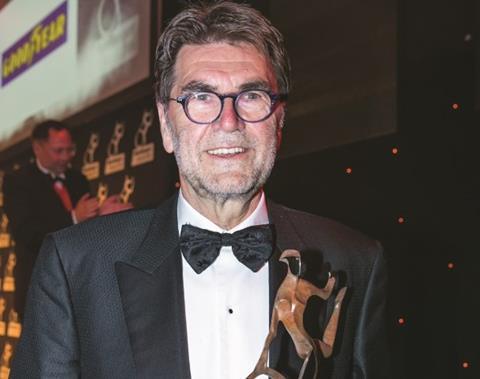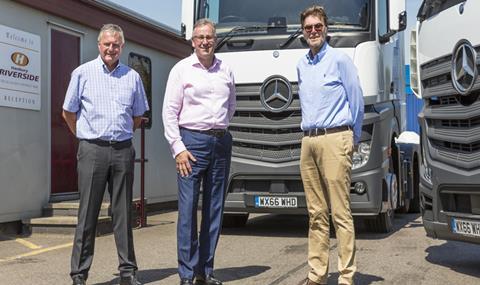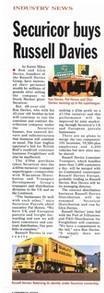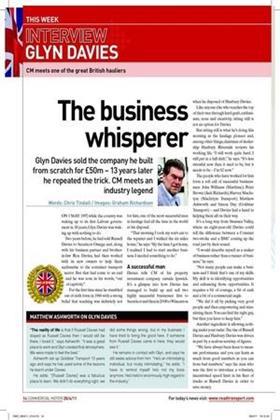
After 53 years in the road transport business, building up and selling three successful businesses, Glyn Davies has retired. Or has he? Steve Hobson hears his remarkable story.
By any standards Glyn Davies has had a successful career in road transport. After starting out aged 17 as a management trainee he recently sold his third business, Hanbury Riverside, and finally retired at the age of 70.
“One of my sons Dan is in property development, selling new houses and it is really hard work,” Davies says. "There is not a very good feeling right now and people are very cautious about committing to debt. It’s all quite challenging – trucks too are lasting longer and operators are running them on longer. Which is why it is a good time to go.
“The main driver for me is age. You can go on too long and I’ve had a very good run - 53 years is a long time. At the age of 70 I doubt I will start again for the fourth time. I am too old to have another go. I’ve had opportunities to re-enter the transport market – there was one in particular that was quite appealing and had I been 10 years younger I might have done it.”
Non-exec roles
He is however retaining a couple of non-executive directorships and remains open to interesting offers.
“I am carrying on with my non-exec jobs including working for Dan’s property business where I am also a shareholder. I have been with Culina for nine years and I will carry on there as I really enjoy that – it is a sound business with a flat and effective structure a bit like the old TDG used to be.
“I also enjoy working with Heathrow airfreight business Goldstar which is a smaller business that is in transition but is well run. As long as it adds value and I can help I will stay involved. I will know probably before they do if I’m not adding value and I will be the first to say ‘you can do without me’.
“If someone came along with an opportunity I wouldn’t say ‘no’ but it would have to be a fit not a conflict with what I’m doing now. Never say never.”

Although Davies claims not be emotional about business, he admits that walking out of Hanbury Riverside for the last time in July 2018 was a wrench.
“It was a difficult decision to finally let the reins go at Riverside,” he says. “It is something I have been involved with for 21 years and when we did the handover to Asset Alliance I hadn’t thought too much about it until I was walking out and said goodbye to everybody. One lady started crying and it was a bit of moment.”
While Davies is a keen sports fan he freely admits his life has been absorbed in his work.
“The last 50 years hasn’t felt like work to me – it has been more of a passion than a means to earn money,” he says. “I will miss it but I am a keen football supporter and a season ticket holder at Arsenal and Ipswich. I also have a debenture at Lords and love cricket.
“We have a property in Spain but we never go for more than a week and when I’m there I’m still working. It’s not a holiday. The key things to me in my career were that I was born into it, I was interested in it and I had pretty good formal training as a management trainee with P&O.
"They gave me some fantastic opportunities which I probably wouldn’t get today. I was flying solo as a manager at 19 and happened to land in the right place at the right time. That was Felixstowe at a time when there was a revolution in the docks as containerisation was just taking off. I thought ‘I need to take advantage of this’. I had a chairman in Ted Haines at P&O who was quite an inspiration and he taught me that humility was far better than being arrogant. I adopted that as a management style and I think it paid off.”
Tribute
Like many successful people Davies is quick to pay tribute to those who have helped him along the way.
“I’ve been very fortunate in my business life to have worked with some fantastic people. At Russell Davies I had an excellent partnership with my brother-in-law Ron Davies that worked really well for us,” he says. “We had some great people through the system who were instrumental in helping us along the way. We were able to inspire them so we got a lot out of them and they got a lot out of us.”
Davies is a numbers man and believes in having strong accounting and reporting systems rather than flying “by the seat of our pants”.
“We weren’t shy about getting into IT very early on and we were courageous in that area,” he recalls. “I remember buying an IBM System 38 in the early 1980s when none of us knew really what it was. We couldn’t find suitable off-the-shelf programs to run our business so we wrote our own. That gave us an edge and put us ahead of the game for a while.”
Parting gift
When it was time to first go it alone, he and Ron were given the name Russell Davies as a parting gift by P&O.
“Our early endeavours were all in the maritime trade. We went from a standing start in 1974 to becoming the market leader by 1987,” says Davies. “In 12 years we had taken ourselves from nowhere to being the dominant player in that sector. Our biggest rival was Brain Haulage, founded by Charles Brain in 1950. As early as 1977 we got into exclusive inhouse transport management arrangements with a number of shipping lines. The first was with Geest North Sea Line and when they approached us to ask us to manage their road haulage delivery and collection operation we were quite small.
“But their UK director said ‘it isn’t your size I’m interested in, it is your people’. That led us into replicating that offering throughout the industry. We were in dedicated arrangements with 10 or 12 shipping lines. That in turn led on to a joint venture with Freightliner which in those days was part of British Rail and that gave us another USP.”
But rather like John Williams at Maritime Transport 15 years later, Davies recognised that the company was a one-trick pony that had to diversify to thrive.
“We realised towards the end of the 1980s that we were a one-product business,” he says. “If were going to add value we needed to replicate that in contract distribution. At that time Wincanton and Exel Logistics were dominant and we wanted to be in that arena. Remarkably we managed to do it. We started by acquiring a £1m general haulage business and when I left in 1997, two years after we were taken over by Securicor, that division was turning over £55m.”

After an amicable parting of the ways with Securicor, Davies set up Hanbury Holdings in 1998 and got back into transport in 1999. “We acquired Goodway and Roadwell, two local transport companies in East Anglia with 125 trucks each,” he recounts. “We merged those on 1 January 2000 and soon found we were losing £20,000 a week, which was quite scary. We realised we had lost our match fitness because we had been out of the game for a while.
“So we assembled a team using the same principles of good people, good IT and a good commercial approach and turned that business around. We reduced the fleet from 250 to 180 vehicles initially and when we sold it eight years later for £35m we were running 550 trucks.”
When Davies sold Hanbury to Wincanton in 2007 he bought back the truck dealership Hanbury Riverside.
“When we had the haulage business we were able to feed from one company to the other to the benefit of both. When we lost the ability to do that we had to reinvent ourselves,” he says. “Hanbury Riverside was a nice business and had always been highly profitable. When we bought it, it was a business that sold used vehicles. So half the effort was selling the stock and the other half was replenishing it. We would either be in buying mode or selling mode.
“We figured out that in 2003 if we didn’t have to do as much sourcing we could sell twice as much so we started contract hire. By putting vehicles out on one or two year deals we had a pipeline of used stock and that worked really well.”

While most hauliers would regard selling trucks as an easier life, Davies says both businesses need an excellent understanding of business principles.
“Operating trucks as a haulier is a tough business and to be successful you have to have the right mix of revenue, a total grip on your costs and have an operating team and systems that can maximise revenue and minimise cost,” he says. “It’s not rocket science, but it’s intense, relentless. One thing I learnt early on is that unlike a product we have no shelf life. If we don’t sell our service today we can’t make it up tomorrow. To make money running a transport business you have to be pretty good at it.
“Selling trucks is an artform in its own right as well. It is about understanding the market and the right specification. Historically there have been three makes that sell well and four that sell less well. That is still the case and there are two that are stronger today [the Swedish brands] and the rest are in a different category.
“I ran that business for 21 years and I understand it. A remarkable statistic is that for more than 90% of the vehicles we sold, the customers didn’t see them before they took delivery. That is about reputation and being trusted and respected. It takes a long time to develop that kind of reputation and not very long to lose it.”
While some believe nice people can’t success in business, Davis argues the exact opposite.
“I have been buying vehicles for over 50 years – the first was a 1968 ERF – and to be the best buyer it’s not by being a bully and beating people down on price because eventually no one will want to deal with you,” he says. “You will be the best buyer by understanding the market and what the manufacturer is looking for. There will also be an OEM who will want to do a deal.
"Less so today but they have always been concerned about registration figures and their percentage of the market. One of them would say ‘we need to move from 7% to 12% and we are going to give our vehicles away’. They would do that for a while and then realise it wasn’t working and they would retrench. Then one of the others would do it so you have to play the market.”
Davies on...Euro-6
Even though he was dealing rather than running trucks in 2015, Davies is blunt about the sales tactics employed by the OEMs in the transition from Euro-5 to Euro-6.
“Were operators conned into buying Euro-5? Absolutely,” he says. “That was the biggest con going. The market was terrorised in 2012/13 and the OEMs were all saying ‘Euro-6 will be £10,000 more than the old vehicle and 10% worse on fuel so you all need to buy Euro-5s’. We all believed them and nobody bought Euro-6.
“No one was mad enough to pay £10,000 more so the market was flooded with Euro-5s. When Euro-6 came in it was never £10,000 more. It may have been £4,000 or £5,000 more but lo and behold it was 10% better on fuel. So everyone felt conned. We acted quite quickly and once we realised where Euro-6 prices would settle we elected early to get rid of our Euro-5s in 2014 so we were out of Euro-5 by 2016. The first few Euro-6s we got were the same price as Euro-5 because no one was buying them. So we were selling nine month old Euro-5s and bringing in Euro-6s early.”
Davies on...foreign trucks
When asked what he would change about the transport industry if he could be in charge of the DfT for a day he has no doubts – the UK should be taking a much tougher line on foreign vehicles.
“Foreign vehicles entering this country do not operate to the same standards we do,” he insists. “As an industry we are pretty compliant but European nations don’t have that same regard for the law. We have to find a way of dealing with these foreign vehicles. You see them on five axles and you know they are over 38 tonne so why aren’t they preventing this? Cabotage isn’t enforced either – I see it in Felixstowe where a foreign driver comes in and he is working locally for two weeks. It’s wrong.”
Davies is however a fan of the DVSA’s Earned Recognition scheme, which should he says allow the regulators to focus on the seriously non-compliant. “You can’t be totally self-regulating but they ought to leave the top 30% alone and be putting their energy into the 20% or 30% who are abusing the system,” he says. “My first target would be foreign vehicles and those UK operators who are in the red and amber. Let’s not worry about the greens.”
Davies on...driver shortages
Solving the driver shortage will require higher wages and government funding for training.
“Driving is a job that people don’t want to do any more,” he reflects. “If I go back 40 years I used to get tradesmen leaving the building trade to become a lorry driver - that would not happen today because in the building trade they can earn more money. What used to appeal to these guys was the freedom of being away for a few days. Compliance and telematics have killed that – they have nowhere to hide and there is no free spirit in this job any more. It is all process now.
“Two things would help – pay them more money and introduce a government-backed apprenticeship scheme. There should be grants to encourage apprenticeships in driving and office functions such as traffic planners. They need to be properly trained and they need to earn more money.
“This might mean a short term erosion of margins for operators but ultimately the chickens will come home to roost. A train driver can now earn £100,000 a year while a lorry driver is earning £40,000 – both are responsible jobs and the lorry driver is working longer hours.
“We should pay our better, more experienced drivers more. Whether you have four or 40 years experience the rate of pay is the same and that’s wrong. If you can encourage a culture of rewarding better performance that has to be the way forward because the good drivers are worth more than the rest.”
Glyn Davies curriculum vitae
1949 Born in South Wales
1966 Management trainee with Coast Lines subsidiary Thomas Allen
1971 Coast Lines acquired by P&O
1972 MD of P&O subsidiary Coastal Railways
1974 Formed container haulier Russell Davies with brother-in-law Ron Davies
1988 Expanded Russell Davies into contract distribution
1995 Sold Russell Davies to Securicor for £58m
1997 Acquired truck dealership Riverside Commercials
1998 Created Hanbury Holdings with Philip West and Ian Wilson
1999 Acquired hauliers Goodway and Loadwell to form Hanbury Davies
2007 Sold Hanbury Holdings to Wincanton for £35m. Davies, West and Lee Smith buy back Hanbury Riverside
2016 Receives Motor Transport Service to Industry Award
2018 Sold Hanbury Riverside to Asset Alliance for £17m. Davies and West retire while Smith stays on with Asset Alliance














